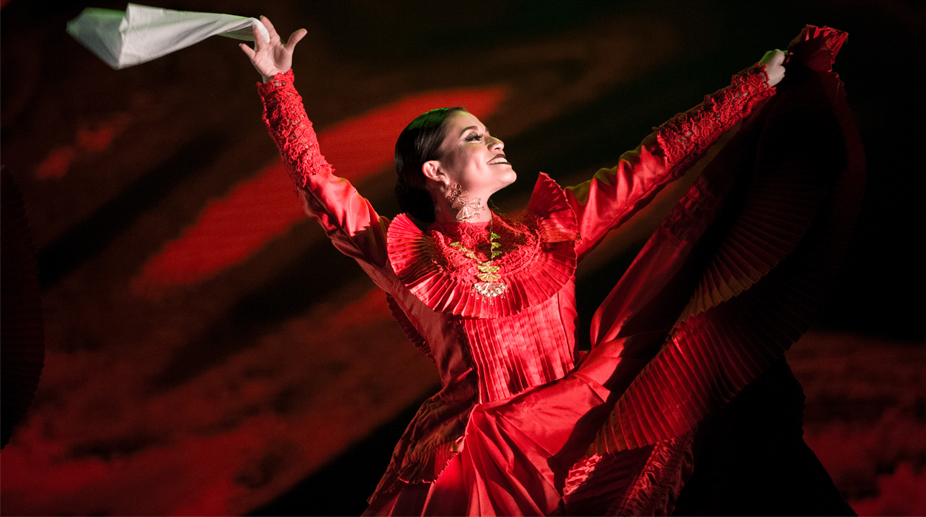From doping ban to Arjuna Award, hockey star Jarmanpreet Singh talks about his comeback
"Challenging times help you learn in life," says Paris Olympics bronze medalist in hockey, Jarmanpreet Singh as he reviewed the ups and downs of his life.
“It’s a big win and we are here to really enjoy it,” said Paris 2024 bid co-chief Tony Estanguet.

A dancer performs during the opening ceremony of the 131st IOC Session (Photo: AFP)
The International Olympic Committee will confirm Paris and Los Angeles as hosts for the 2024 and 2028 Olympics here on Wednesday, crowning two cities at the same time in a historic first for the embattled sports body.
After a week that has seen the IOC forced onto the defensive over mounting corruption allegations, the Olympic movement will bask in a welcome jolt of good news the two cities celebrate their respective awards.
Advertisement
Both will go through the formalities of outlining their bids in 25-minute presentations to the IOC membership starting at 12 PM (1700 GMT) local time at Lima Convention Centre.
Advertisement
At 1 PM (1800 GMT) the IOC will vote to ratify the deal, bringing to an end a mostly amicable campaign that has been stripped of the usual drama and intrigue ever since Paris and Los Angeles agreed to split 2024 and 2028 in July.
“It’s a big win and we are here to really enjoy it,” said Paris 2024 bid co-chief Tony Estanguet, reflecting the triumphant mood among the 60-strong French delegation in the Peruvian capital.
Los Angeles officials meanwhile insist they are more than satisfied with the outcome, rejecting suggestions that their failure to win the 2024 Games represented a defeat.
The California metropolis will receive roughly $100 million more than Paris 2024 in IOC funding for 2028, and will also benefit from a $180 million interest-free advance which means the city can begin to create a sporting legacy well before the Games take place in 11 years’ time.
“We think the result is extraordinary,” Los Angeles 2028 bid chief Casey Wasserman said. “We’ll be celebrating on Wednesday night.”
IOC President Thomas Bach, the driving force behind the double award, described the candidacies as a “golden opportunity”.
“For the IOC it would have been a huge mistake not to seize this golden opportunity,” said Bach.
Paris and Los Angeles emerged from the initial bidding race for the 2024 Games after a number of cities which withdrew citing waning public support and concerns over budget.
Hamburg, Rome, Budapest and Boston all fell by the wayside during the competition, reflecting the political difficulties in persuading voters that staging the Olympics is worth the multi-billion-dollar price tag.
It mirrored a similar trend in the bidding for the 2022 Winter Olympics, when only two cities — Beijing and Almaty threw their hats into the ring. Eight years earlier, seven cities had bid.
Bach first signalled publicly that the double-award of an Olympics could be on the agenda in December last year, lamenting that the bidding process produced “too many losers”.
As the tussle for 2024 unfolded, and as the field thinned to leave just Los Angeles and Paris, the IOC’s determination to secure two high-quality bids for the next two summer games became apparent.
In July, the IOC announced it would award the staging rights for the 2024 and 2028 Olympics at the same meeting in Lima, laying the way for a swift agreement between the two over the running order.
The drama-free conclusion to the race also eliminates the risk of the vote being tainted by the sort of scandal that has embroiled the ballot for the 2016 Olympics.
The IOC was left tackling a fresh wave of graft allegations last week when investigators in Brazil swooped on the country’s Olympics chief Carlos Nuzman.
Nuzman stands accused of plotting to bribe IOC members into awarding Rio de Janeiro the 2016 Games at a 2009 vote in Copenhagen.
The allegations swirling around Rio’s bid revived memories of the Salt Lake City bribery scandal, which led to 20 IOC members being either kicked out of the Olympics’ ruling body or pleading guilty to accepting bribes for votes.
French investigators meanwhile have already announced they are investigating the 2013 vote in Buenos Aires which awarded the 2020 Olympics to Tokyo, following reports of secret payments into a Singapore-based bank account linked to the son of disgraced former world athletics chief Lamine Diack.
The latest case forced Bach onto the defensive on Monday during a press conference in which he was repeatedly asked about his handling of the affair.
“No organisation in the world is immune. No law is so perfect that it cannot be broken,” Bach said. “We feel we have done what we can do.”
Advertisement